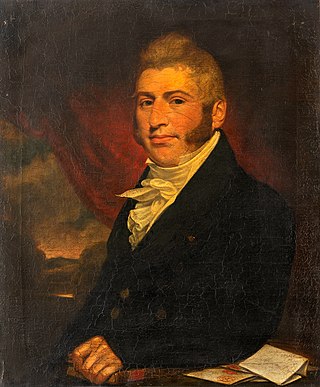
John Abercrombie was a Scottish physician, author, philosopher and philanthropist. His Edinburgh practice became one of the most successful medical practices in Scotland. The Chambers Biographical Dictionary says of him that after James Gregory's death, he was "recognized as the first consulting physician in Scotland". As surgeon to The Royal Public Dispensary and the New Town Dispensary he provided free medical care for the poor of the town and taught medical students and apprentices. He published extensively on medical topics and latterly on metaphysics morality and religion. A devout Christian, he gave financial support to missionary work. Abercrombie was awarded the honorary degree of MD from the University of Oxford, was elected Rector of Marischal College and University, Aberdeen and appointed Physician to the King in Scotland.
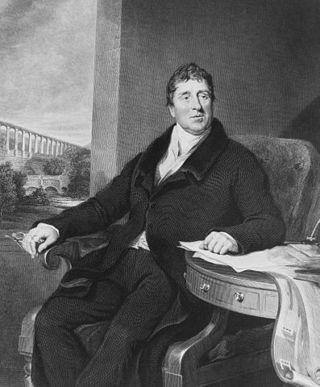
Thomas Telford was a Scottish civil engineer. After establishing himself as an engineer of road and canal projects in Shropshire, he designed numerous infrastructure projects in his native Scotland, as well as harbours and tunnels. Such was his reputation as a prolific designer of highways and related bridges, he was dubbed the Colossus of Roads, and, reflecting his command of all types of civil engineering in the early 19th century, he was elected as the first president of the Institution of Civil Engineers, a post he held for 14 years until his death.

Kirkcudbrightshire, or the County of Kirkcudbright or the Stewartry of Kirkcudbright is one of the historic counties of Scotland, covering an area in the south-west of the country. Until 1975, Kirkcudbrightshire was an administrative county used for local government. Since 1975, the area has formed part of Dumfries and Galloway for local government purposes. Kirkcudbrightshire continues to be used as a registration county for land registration. A lower-tier district called Stewartry covered the majority of the historic county from 1975 to 1996. The area of Stewartry district is still used as a lieutenancy area. Dumfries and Galloway Council also has a Stewartry area committee.

John Galt was a Scottish novelist, entrepreneur, and political and social commentator. Galt has been called the first political novelist in the English language, due to being the first novelist to deal with issues of the Industrial Revolution.

Robert Stevenson, FRSE, FGS, FRAS, FSA Scot, MWS was a Scottish civil engineer, and designer and builder of lighthouses. His works include the Bell Rock Lighthouse.
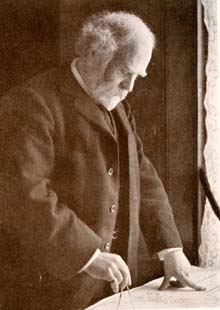
Sir John Murray was a pioneering Canadian-born British oceanographer, marine biologist and limnologist. He is considered to be the father of modern oceanography.

James Finlay Weir Johnston, FRS FRSE was a Scottish agricultural chemist and mineralogist.
Catch the ten, also called Scots whist or Scotch whist, is an 18th-century point-trick ace–ten card game that is recorded as being played only in Scotland, although evidence suggests a possible German origin. Unlike standard whist, it is played with a pack of only 36 cards, the fives and below being omitted. In the trump suit, the jack is the highest card. Despite its alternative name, it has nothing to do with standard whist.

Birkie or Birky is an historical Scottish west coast card game for two players that is first recorded by Sir Walter Scott in 1819. It has been equated to Beggar my Neighbour, however, its rules are different.
Hugh McMillan is a Scottish poet and short story writer.

Borgue is a village and parish in the Stewartry of Kirkcudbright in Dumfries and Galloway, Scotland. It lies 5 miles south-west of Kirkcudbright and 6 miles south of Gatehouse of Fleet. The name Borgue is from Old Norse borg 'stronghold'.
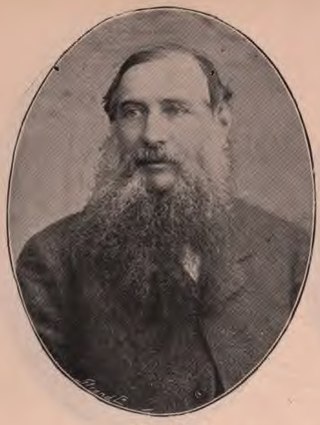
Samuel Smith was a British politician. He served as a Liberal Member of Parliament (MP) from 1882 to 1885 and from 1886 to 1906. He was noted for being a champion of "social purity" and opposed many plays with open displays of sexuality that he saw as "glorification of the vulgarest debauchery". Targets included the plays The Gay Lord Quex and Zaza.
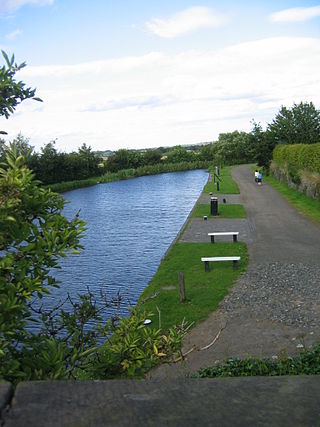
Hugh Baird was a Scottish civil engineer, who designed and oversaw the building of the Union Canal.

William Anderson (1805–1866) was a Scottish miscellaneous writer in the departments of history, biography, and science. He was born at Edinburgh and educated there, and placed in a lawyer's office. As an author he published Poetical Aspirations; Landscape Lyrics; Popular Scottish Biography; Treasury of Nature, Science, and Art and an extensive work widely known as The Scottish Nation. He also assisted for some time in managing Aberdeen Journal, Witness, and Daily Mail newspapers. He died, aged 61.

Thomas ThomsonFRSE FSA Scot was a Scottish advocate, antiquarian and archivist who served as Principal Clerk of Session (1828–1852) and as secretary of the literary section of the Royal Society of Edinburgh (1812–20).
James Esdaile (1775–1854) was a Scottish minister and writer who spent his working life mainly at the East Church, Perth, Scotland.
Events from the year 1842 in Scotland.
Events from the year 1830 in Scotland.

Andrew Brown was Professor of Rhetoric at the University of Edinburgh and Moderator of the General Assembly of the Church of Scotland in 1813. He was also a historian and author, closely connected to the history of Nova Scotia having served as a minister at St. Matthew's United Church in Halifax.
The Scottish Gallovidian Encyclopedia is a wide-ranging reference work written by John Mactaggart, published in 1824 and reissued after the author's death in a run of 250 copies in 1876. The scope of the work is given by its full title: The Scottish Gallovidian Encyclopeida, or, the Original, Antiquated, and Natural Curiosities of the South of Scotland; Containing Sketches of Eccentric Characters and Curious Places, with Explanations of Singular Words, Terms, and Phrases; Interspersed with Poems Talks, Anecdotes, etc., and Various Other Strange Matters; the Whole Illustrative of the Ways of the Peasantry, and Manners of Caledonia; Drawn out and Alphabetically Arranged.













